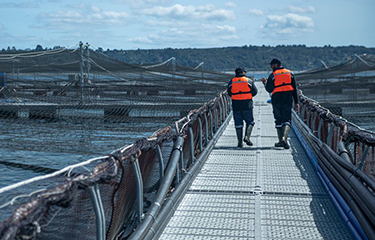Chile's salmon industry backs effort to reform aquaculture laws

Chile’s more than 6,000 kilometers of coastline provides an environment ideal for highly productive fishing and aquaculture activities that directly contribute to national and global food security.
The two activities, however, vary radically in their operational needs and have different regulations, leading the Chilean government to plan an update to its existing national fisheries law that currently lumps the two sectors together. The government expects to converse with different stakeholders throughout September, with the ultimate goal of presenting a bill during the fourth quarter of 2023.
The country’s salmon-farming sector brought in USD 6.6 billion (EUR 6.1 billion) in 2022 but has struggled to balance operational growth with environmental demands. Chilean President Gabriel Boric has made reform of the country's fisheries law a priority since he took office in March 2022, and over the past year, his government has ramped up its regulation of the aquaculture sector. In response to the discovery of numerous regulatory violations, Chile's regulatory authorities have limited the industry's operational expansion.
Over the past decade, aquaculture production has grown about 3 percent annually in Chile, but with the new restrictions, the sector is reaching production limits. Without room to expand, operators have a hard time justifying major investments, according to Adolfo Alvial, an aquaculture industry consultant and founder of consultancy ORBE XXI and Chile’s Aquaculture Innovation Club, which was created to support the country's aquaculture industry.
“It's great that the government has announced that it’s considering a new fishing law and a separate law for aquaculture," Alvial told SeafoodSource. "This forced union between fishing and aquaculture under the existing law has led to very complex legislation that was created in 1992, but has had a number of adjustments, and the law is difficult to read. When it’s so complex, compliance with the law is also complex."
Although Alvial is optimistic, he said he still believes work needs to be done to implement “a new institutionality with proper resources to make [compliance of the law] a feasible reality.”
“Having an institutional separation, with one subsecretary of fishing and another for aquaculture, along with supporting state organizations for each sector, doesn’t necessarily mean more resources but optimized resources of that which exists, divided between the two,” he said.
Besides the current fisheries law, other governmental bodies – from the national fishing service Sernapesca, to the environmental watchdog SMA, to the Undersecretary of Armed Forces – all regulate the industry.
Alvial said besides the regulatory overlap, Chile's aquaculture sector is also finding it difficult to increase production due to a lack of innovation. That is a position shared by Chile Undersecretary of Fisheries and Aquaculture Julio Salas.
“With the current regulation levels and the degree of saturation of the available spaces in the fjords [where aquaculture practices take place in the south of Chile], we are reaching a ceiling for this activity," Salas told Chilean newspaper El Mercurio. "Part of the public-private conversation of a general aquaculture law has to be able to imagine new technologies, new spaces, and new consensus in the territories where the activity is carried out, [such as] exploring aquaculture on the high seas,”
The upcoming law must create new space for aquaculture to relocate and expand, Chilean Salmon Council Executive Director Loreto Seguel said. Several salmon farms in areas subsequently designated as national parks or other protected zones have been forced to limit operations or been told to relocate, but the government has not issued a relocation permit in the past 12 years.
“Of approximately 500 applications, close to 200 have been rejected, and the rest are in process. Zero relocations have materialized,” she said.
Additionally, environmental organizations have been active in campaigning against salmon farming in Chile, with a recent focus on shutting down their work in protected areas where they were initially permitted to operate.
Chile’s salmon sector is responsible for the creation of some 70,000 jobs, many in rural areas, and supports more than 4,000 small and medium businesses, accounting for the equivalent of 18 percent of GDP in some rural areas.
Since Boric won the presidency, Chile's aquaculture industry has been forced to confront its own operational shortcomings. Many of Chile's salmon farming companies have received penalties within the past two years for a range of violations, from wastewater mismanagement, fish escapes, and particularly overproduction, which generates an increased contribution of organic and inorganic matter and also raises the risk of fish escapes and the spread of fish diseases and prophylactic drugs into the marine environment, according to the SMA.
Individual companies ignoring the legal limits of their permits has been ...
Photo courtesy of the Chilean Salmon Council




Share